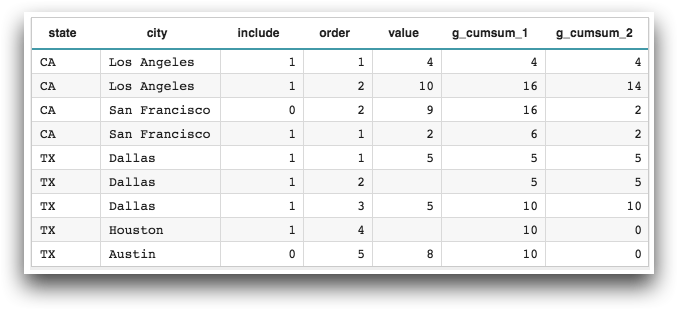g_cumsum(G;S;O;X)
Returns the cumulative sum within a given group.
Function type
Vector only
Syntax
g_cumsum(G;S;O;X)
t_cumsum(X)Input
| Argument | Type | Description |
|---|---|---|
G |
any | A space- or comma-separated list of column names Rows are in the same group
if their values for all of the columns listed in If If any of the columns listed in |
S |
integer | The name of a column in which every row evaluates to a 1 or 0, which determines
whether or not that row is selected to be included in the calculation If
If any of the values in
|
O |
integer | A space- or comma-separated list of column names that
determine the row order within a particular group If
If any of the values in |
X |
integer or decimal | A column name An N/A in |
Return Value
For every row in each group defined by G and ordered by O
(and for those rows where S=1, if specified),
g_cumsum returns a decimal number corresponding to the sum of
X for all rows up to and including that row.
If no rows in a group have valid (non-N/A) values for X, the result for
every row of the group is 0.
Sample Usage
<base table="pub.doc.samples.ref.func.g_func_time_series_sample_usage"/> <willbe name="g_cumsum_1" value="g_cumsum(state;include;order;value)"/> <willbe name="g_cumsum_2" value="g_cumsum(state city;include;order;value)"/>

Additional Information
- The
t_version of this function defaults theGargument and omits theSargument. The default forGis set at table load time based on the organization of the table.
